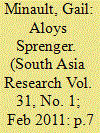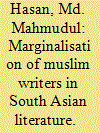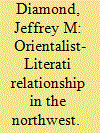|
|
|
Sort Order |
|
|
|
Items / Page
|
|
|
|
|
|
|
| Srl | Item |
| 1 |
ID:
103683


|
|
|
|
|
| Publication |
2011.
|
| Summary/Abstract |
Aloys Sprenger (1813-1893) was an Austrian scholar with a medical degree who joined the British East India Company's medical service in order to pursue in India his real passion, the study of oriental literatures. He became the Principal of Delhi College in 1845, and presided over an experiment in learning at Delhi College, an institution that taught both eastern and western literatures and sciences through the medium of Urdu. The college attempted to bring about a creative synthesis of the two curricula, via an active programme of translation and publication. Sprenger helped launch a series of scholarly journals published by the college, thus contributing to the dissemination of knowledge and the nurturing of a group of students and faculty with whom he maintained an active correspondence after leaving the college. This collection of letters has not been adequately evaluated earlier as an indication of the collaboration between western and Indian intellectuals in the period before the revolt of 1857. Most accounts of Sprenger's contributions to Delhi College have been laudatory. There was, however, a darker side to Sprenger's stewardship that deserves elucidation. Based on archival research, the present article seeks to evaluate Sprenger's ambiguous intellectual legacy to Delhi College and to the evolution of education in British India.1
|
|
|
|
|
|
|
|
|
|
|
|
|
|
|
|
| 2 |
ID:
117598


|
|
|
|
|
| Publication |
2012.
|
| Summary/Abstract |
This article argues that there appears to be a pattern of disregarding the literary contributions of South Asian Muslim writers who produced English texts on a variety of topics. It then mainly contextualises Rokeya Sakhawat Hossain's English works in the tradition of South Asian writing in English to identify a continuous trend of undervaluing Muslim literary contributions in English in the region. The article thus argues for a re-assessment of the evaluation of this literary tradition, so that the many forgotten South Asian Muslim writers in English, including Rokeya, regain their long overdue recognition.
|
|
|
|
|
|
|
|
|
|
|
|
|
|
|
|
| 3 |
ID:
103685


|
|
|
|
|
| Publication |
2011.
|
| Summary/Abstract |
Lahore emerged as a new intellectual centre in northwest India for British Orientalists and Indian intellectuals after the destruction of Delhi during the Great Revolt of 1857. Two prominent individuals who moved to Lahore at this time were Gottlieb Leitner, a philologist and Orientalist scholar, and Maulana Muhammad Hussain Azad, an Urdu poet, literary critic and teacher. Leitner, a naturalised British citizen who studied in Istanbul and completed higher education in Arabic and Turkish in London, became principal of the new Government College in Lahore in 1864. In this position, he exercised a deep influence on education in the northwest by promoting the development and study of vernacular (Urdu language) education, founding and leading a major scientific and literary organisation, the Anjuman-e Punjab. Having aroused strong British opposition, both to his ideas and his combative personality, Leitner's support and assistance from the local literati allowed him to develop and implement his ideas. Leitner's most significant partner was Muhammad Hussain Azad, also a new arrival to Lahore after fleeing Delhi in 1857. Leitner and Azad worked together in the Anjuman-e Punjab to promote their literary and social concerns. They became advocates of neo-Orientalist educational reforms through their public speeches and writing, including works in Urdu intended for, among others, the education of Maulvis. The bracketing of these European and Indian partners is conceptualised in this article through their roles as members of their respective communities as well as outsiders to these very communities. The analysis shows how their complex identities helped them to become highly influential figures in the new cultural environment of post-1857 Lahore.
|
|
|
|
|
|
|
|
|
|
|
|
|
|
|
|
|
|
|
|
|